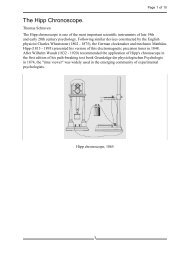THE HIPP CHRONOSCOPE
THE HIPP CHRONOSCOPE
THE HIPP CHRONOSCOPE
You also want an ePaper? Increase the reach of your titles
YUMPU automatically turns print PDFs into web optimized ePapers that Google loves.
1. A FEW WORDS AT <strong>THE</strong> BEGINNING<br />
To protect all the old chronoscopes mentioned in my report, the information about the<br />
location has been shortened to a minimum in most cases. All scientists, psychologists,<br />
historians, and other persons who wish more detailled information for their research should<br />
get in touch with Rand Evans, Henning Schmidgen, or myself.<br />
This was my first research with help of the Internet [141]. I would even say that it was<br />
possible with support of the Internet only. After a short time I recognized that the Hipp<br />
chronoscope is well known, but the knowledge about its development and history is more<br />
fragmentary. Only a handful of scientists in the field of psychology and history of science are<br />
familiar with this instrument. I want to refer to the excellent works of Rand Evans [48, 49],<br />
Andrea Gaeta [66], Horst Gundlach [75, 76, 77], and Henning Schmidgen [137].<br />
After two years my research has spanned the globe like a net of a spider. I have found helpful<br />
hands all over the world. Over the last three years, almost 400 mails came in from Australia,<br />
America, Canada, Japan, and Europe. Kind persons have patiently answered my questions and<br />
added new pieces to the never-ending chronoscope jigsawpuzzle.<br />
This has made it possible to register 102 chronoscopes of the Hipp style. I would like to thank<br />
all nice persons who have given me friendly support. I want to express my special gratitude to<br />
a couple of scientists who have given friendship and help and encouraged me not to give up<br />
and to finish this research:<br />
David Baker Akron, Archives of the History of American Psychology<br />
Paolo Brenni Florence, Institute for the History of Science<br />
Rand Evans Greenville, East Carolina University, Department of<br />
Psychology<br />
Horst Gundlach Passau, University, Institute for the History of Psychology<br />
Hans Jochen Kummer Ludwigshafen<br />
Tom Perera Montclair, retired now<br />
Ute Saccardi Stuttgart, Library of Stuttgart<br />
Henning Schmidgen Berlin, Max Planck Institute for the History of Science,<br />
Berlin<br />
Steven Turner Washington DC, Smithonian Institute<br />
My friend Rand Evans has corrected this paper. I would like to thank him very much for his<br />
friendly support. My friend Henning Schmidgen has prepared the Internet presentation of this<br />
paper. I would like to thank him for his help and assistance. He has accompanied my research<br />
since our first contact in 2000.<br />
2




